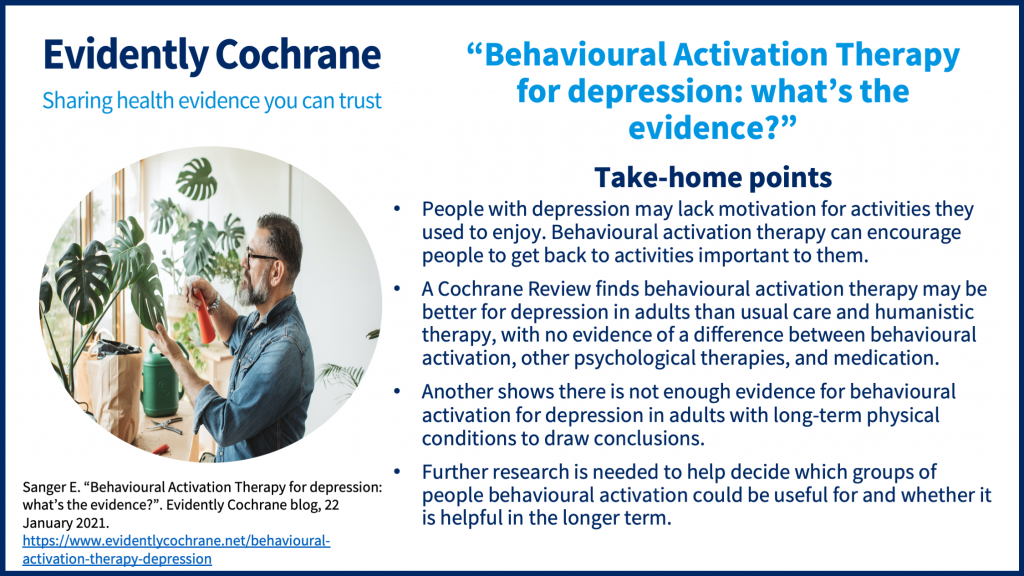
How well does behavioural activation therapy work for depression in adults? And what about the effects of this treatment on depression for adults with long‐term physical conditions? Two Cochrane systematic reviews look at the available evidence.
Depression is a common mental health problem. It can cause a persistent feeling of sadness and loss of interest in people, activities, and things that were once enjoyable. Treatments for depression include psychological therapies (talking therapies). Two reviews recently by Cochrane Common Mental Disorders focus on a type of psychological therapy called behavioural activation.
Behavioural activation encourages a person to develop or get back into activities which are meaningful to them. The therapy involves scheduling activities and monitoring behaviours and looking at specific situations where changing these behaviours and activities may be helpful. A therapist may support people in person, over the phone, or online, usually over multiple sessions.
Behavioural activation is increasingly receiving attention as an intervention which may require fewer resources and less specialist training than other treatments for depression. This could make it easier to implement in a wide range of settings, including low- and middle-income countries and other settings with fewer specialists available to deliver treatments. It is important that the implementation of behavioural activation in practice is supported by up-to-date evidence.
Systematic review: Behavioural activation therapy for depression in adults
The first review published assessed whether behavioural activation can be an effective and acceptable treatment to offer to people with depression. Fifty-three studies were included.
The review found that behavioural activation may treat depression better than receiving usual care or humanistic therapy.
It was uncertain whether behavioural activation worked better than medication, being on a waiting list, or receiving a range of other psychological therapies. There was no evidence available comparing behavioural activation to no treatment, placebo treatment, and integrative therapies.
Authors found no differences in the efficacy of behavioural activation compared with cognitive-behavioural therapy (CBT), third-wave CBT, or psychodynamic therapy.
For most comparators, authors found no differences with behavioural activation in terms of the acceptability of treatments, with the exception that behavioural activation is probably less acceptable to people than usual care (participants receiving behavioural activation were more likely to drop out of the studies).
Lead author, Eleonora Uphoff from the Cochrane Common Mental Disorders Group based at the University of York in the UK to tell us about the findings.
It was concluded that Behavioural activation may be an effective and acceptable treatment for depression in adults. It could be a suitable alternative to existing established treatments such as CBT. Offering this therapy in practice would give people with depression greater treatment choice, and different formats and types of delivery could be explored to meet the demand for mental health support.
The authors had limited confidence in the findings due to concerns about the certainty of the evidence. Most findings were short‐term, meaning that we cannot be sure behavioural activation would be helpful to people with depression in the longer term.
What about people with depression who also have long-term physical health conditions?
In reality many people have more than one health condition. For example, it is common for people with a mental health condition to also suffer from cardiovascular disease, diabetes, cancer, or chronic respiratory conditions.
These long-term physical conditions can impact on mental health, and mental health problems can affect how people cope with a physical condition. Given the complex relationships between mental and physical health, mental health treatments may work differently for people who do and do not suffer from long-term physical conditions. This is why Cochrane Common Mental Disorders is interested in mental health interventions for people with both mental and physical health conditions.
Systematic Review: Behavioural activation therapy for depression in adults with long‐term physical conditions
The second review asked how well behavioural activation treats depression in adults with long-term physical conditions. In this review, far less evidence was found. The review included only two studies; one of people recovering from stroke and the other of women with breast cancer. Behavioural activation was found to be more effective than comparators ‘treatment as usual’ and problem-solving therapy in the short term and medium term. However, these results were imprecise and effects were reduced in the longer term. When looking at depression symptoms, no difference was found.
Blog post for people with depression and their mental health practitioners

A recent Evidently Cochrane blog post from Cochrane UK explored the evidence for Behavioural Activation Therapy. Written for people with depression and their mental health practitioners, Emily Sanger, a junior doctor in York, looks at the latest Cochrane evidence and explores how well it works for depression in adults, with and without long-term physical conditions.
Future directions for Cochrane Common Mental Disorders
It is important that we learn more about how behavioural activation works for different groups of people, such as adults with long-term physical conditions. Cochrane Common Mental Disorders is working on a number of reviews which assess the evidence on mental health interventions for people with physical conditions such as diabetes, and other specific populations and settings. There is a focus on involuntary migrants including children in collaboration with Cochrane Global Mental Health (CGMH). Together with the Cochrane EPOC group and CGMH we are working on reviews of mental health interventions for people living in low- and middle-income countries.

